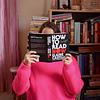Take a photo of a barcode or cover
Graphic: Chronic illness, Mental illness
Moderate: Death of parent
Graphic: Chronic illness, Sexual content
When presented with an unreliable narrator in a story that's supposed to confuse the reader, my preference is to receive at least a few kernels of truth from an outside perspective. That way, I can use those kernels of truth to create my own theories about what is actually going on. Awad doesn't provide any source of truth outside of Miranda's narration, which gives readers no starting point in deciphering what is true and what is not. As soon as I felt like I had a handle on the truth, a bunch of curveballs were thrown. I closed the book having more questions than answers. I assume that was Awad's intent, and it's a valid artistic choice, but it's not my preference. By the end, I was so overwhelmed by the chaos that I didn't care to figure out the truth or tie up the loose ends in my mind.
Basically, if you love weird shit that is not supposed to ever make sense, pick up this book. If you need things to make at least a little sense, skip this one.
Graphic: Chronic illness
Graphic: Ableism, Chronic illness, Drug abuse, Medical trauma
Moderate: Death, Violence
Graphic: Ableism, Chronic illness, Drug use, Medical trauma, Alcohol
Moderate: Sexual content, Blood
Minor: Suicidal thoughts
Good chunks of this book were what I imagine an ecstasy trip would feel like. Miranda, our protagonist, has chronic pain that it seems everyone thinks she could simply will away if she wasn't so set on being miserable. This book is a solid commentary on how society and doctors especially don't take female pain seriously. However, the book takes a turn into magical realism territory when three strange men appear (Macbeth's witches?) to "help" her. This is where the whole "ecstasy trip" thing starts to ramp up. In addition, the ending was very open-ended and a little confusing which was probably the point but just wasn't for me personally. However, I always have to give points to a book for having theatre references.
If you enjoy reading books that are a bit outside the norm, character-driven, and have unresolved endings, you would probably enjoy this more than I did.
Graphic: Ableism, Chronic illness, Injury/Injury detail
Moderate: Suicidal thoughts, Blood
Moderate: Chronic illness, Drug abuse, Drug use
This wouldn't be a Mona Awad book, though, without a hypnotic descent into fever dream territory. After Miranda has a magical encounter at a pub, her narration becomes more and more unreliable. What's real in Miranda's life? She herself has no idea. This segment of the book was certainly an entertaining rollercoaster ride. However, it seemed to drag on and on only to maintain ambiguity. Perhaps my lack of familiarity with Shakespeare's less popular plays is what led to my feeling of disconnect from All's Well by its ending. I could tell that Awad was referencing Shakespearean tropes and characters but many of the references flew right over my head.
Graphic: Ableism, Addiction, Chronic illness, Drug use, Suicidal thoughts, Blood, Injury/Injury detail
Graphic: Chronic illness, Drug use, Sexual violence, Medical content, Injury/Injury detail
Moderate: Chronic illness





